Insights: 12 December 2023
By Jeanice Henderson, In a Good Place Program Coordinator
Despite the many positive aspects of living in remote, rural, and regional communities, there are also distinct challenges associated with distance and isolation, which place these communities at greater risk of poorer mental health outcomes.
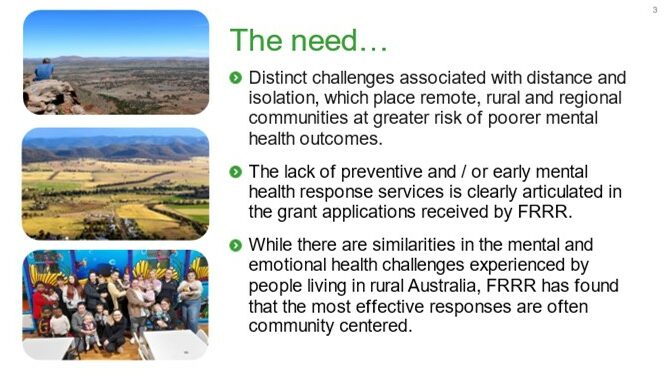
These include:
- Lack of available service or long wait times;
- Poor, interrupted or lack of digital services and access;
- Reduction in volunteers, business closures, job losses, loss of agricultural markets;
- Poorer outcomes in the social determinants of health;
- Life on the land can be hard – drought, fire, flood, mouse plague, cyclones; and
- Stigma, shame, and ‘stiff upper lip’ attitudes to mental health.
The compounding and accumulative effects of some or all of these things take their toll – on individuals, families and the communities they live in.
Local solutions need support
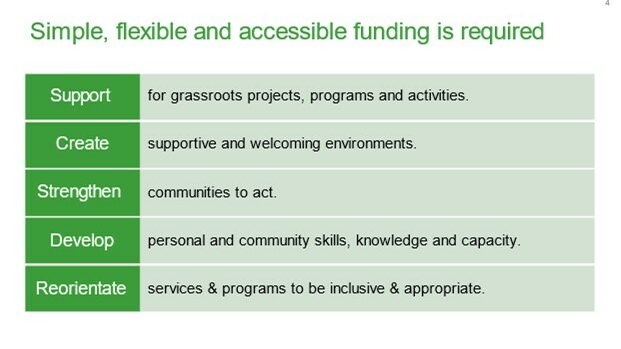
At FRRR, we have found that the most effective responses to these challenges are often community centered but lack access or visibility to government or philanthropic funding.
Simple, flexible and accessible funding is required to support projects, programs and activities that create supportive environments, strengthen communities to act, develop personal skills and support services to re-orientate their programs to be both inclusive and appropriate for all.
This is where philanthropy can play an important enabling role, especially for grassroots organisations that often can’t access traditional philanthropy.
Small grants can be the straightforward and friendly ‘front door’ through which grassroots organisations can step to build their capability, connect their community and navigate and drive change.
In fact, for many communities experiencing disadvantage, small grants are one of the few ways that they can get the resources and opportunities to launch new ideas or approaches in their communities.
While not always ‘sexy’, the projects and the needs met through these grants, can address areas of disadvantage and inequity in communities that often have little visibility to funders and policymakers.
We’ve seen this be particularly effective when those small grants are targeted toward addressing specific needs. A case in point is in the area of mental health.
In A Good Place
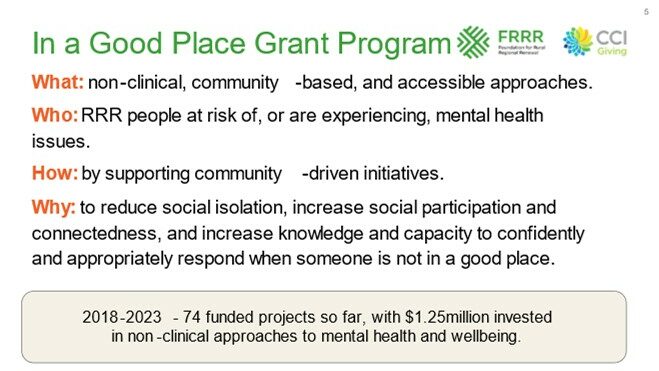
In a Good Place is a national philanthropic grant program, delivered by FRRR and funded in partnership with CCI Giving.
This aim is to support people living in remote, rural and regional communities seeking help who are at risk of, or are experiencing, mental health issues.
The program has a relatively small, flexible funding pool of $250,000 per year, and offers grants of up to $20,000 to enable rural communities to action their ideas and solutions.
Our focus is to support efforts to strengthen the mental health of at-risk or vulnerable people via services or activities that are preventative or responsive in nature and designed to engage those less likely or unable to participate in mental, social and emotional wellbeing activities.
This program truly reflects the FRRR ethos that local communities are best placed to identify local needs, local opportunities and lead local responses.
We have run the program since 2018 and have so far funded 84 projects – that’s $1.25 million in small grants invested into remote, rural and regional communities to support non-clinical approaches to mental health and wellbeing.
We’re very proud of it, but it’s really a drop in the ocean, as demand for this kind of support is very strong – and only increasing. Between 2018 and 2023, 397 applications requested over $6,443,348 in grant funding for combined total project cost of $18,981,059.
Further, 24.8% of these were first time applicants to FRRR, as this is one of the few programs of its type. And, in reality, they are not seeking very much funding – the average request was $16,230.
Of the successful applications:
- The smallest grant was $2,970.
- The average grant was $14,935.80.
- 23.8% were awarded the full grant amount ($20,000).
- Our $1.25 million support projects valued at over $4.5 million.
- Local communities are still putting in a lot – the estimated value of in-kind support for funded projects is $1,126,082.
Every dollar granted by the In a Good Place program was matched by an additional $2.61 in other funding or in -kind support.
Demand is high
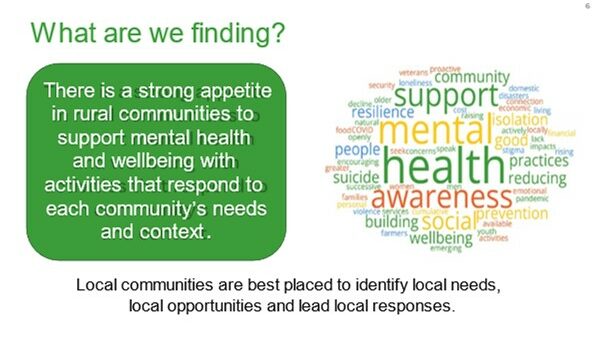
Since the program opened, more than 400 organisations have applied, requesting nearly $6.5 million towards projects with a combined value of over $19 million.
Remember, these are for relatively small grants – up to $20,000 – so it’s clear that there is a strong appetite out there to support community mental health and wellbeing.
Who benefits
So, just who is applying for these grants?
The short answer is grassroots community groups. FRRR doesn’t require applicants to have any special status, such as DRG1. This means we receive applications from community groups that are working directly with community members, families, young people, older people, veterans, gender specific focus groups, mental health and suicide awareness groups, community houses and school councils.
The word cloud above comes directly from the themes listed in this year’s In a Good Place applications. While there are different ideas that appear each round, there are some consistent themes and project approaches each round, including:
- Suicide prevention.
- Capacity building such as Mental Health First Aid training.
- Alleviating loneliness and isolation.
- Projects focused on the mental health of specific cohorts – men, youth, aged, students, families, farmers, culturally and linguistically diverse (CALD) communities.
- Community gardens / horticulture, animal therapy, art therapy nutrition and exercise as integral parts of overall mental health and wellbeing programs.
- Mental health and wellbeing awareness activities.
- Events that bring people together, connect with each other.
- Responding to the impacts of cumulative economic, social and emotional impacts of successive natural disasters and COVID.
Emerging themes of late have included:
- Community based support programs for ADF Veterans / First Responders.
- Supporting those affected by domestic violence.
- Responding to social determinants of mental health, such as food security, housing security / homelessness, disability and under / insecure employment.
- Increased recognition and use of lived experience and peer volunteers.
Proven impacts
There are many stories that we could share about the impacts of these grants and how they have contributed to building healthier, resilient and better-connected communities by supporting and promoting mental health awareness, and building individual and community resilience.
I’m Not Afraid To Talk
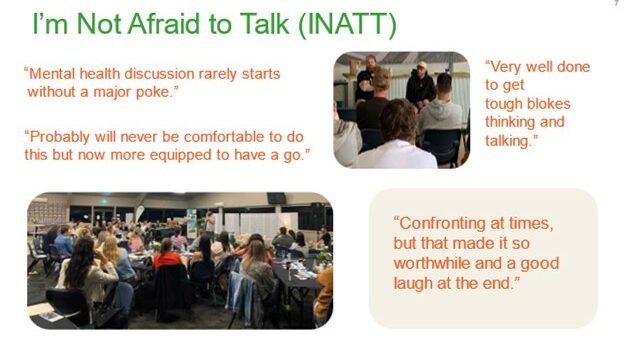
For example – University of South Australia partnered with a community group called I’m Not Afraid to Talk to pilot and evaluate a Men’s Mental Health program. It sought to challenge the stigma surrounding mental health – by doing so in an environment that is very familiar to local men and adolescents – the football club. The aim was to improve mental health and reduce the risk of suicide by providing a safe and informed environment in which to connect with others and normalise self-help seeking.
Working around COVID restrictions, cancellation of the football season, harvesting and extreme weather events, the workshops were held in Kimba, Tumby Bay and Cowell in SA.
Each four-hour workshop featured local speakers who shared their experienced, which was followed by a series of activities that focused on how men may be perceived by others and how they perceive themselves, shared experiences and the importance of ongoing open conversations about mental health.
Comments received after the football club presentations were interesting, but we particularly liked the insight from one man – “mental health discussion rarely starts without a major poke.:
Subsequently, a toolkit was developed by UniSA and INATT to guide the footy clubs in continuing the mental health conversation. The steps and strategies listed in the resource were based on community development principles.
INATT ran an additional workshop for women. This was extremely popular, with more than 80 women attending from Kimba and surrounding communities.
The project leveraged the extremely strong links INATT has with the Greater Flinders and Eastern Eyre communities, which was evident by their excellent leadership and facilitation of the workshops and high attendance, and the expertise of Uni SA in capturing the insights from each workshop and developing the community tool kits for clubs to use.
Melodies, Mates and Mental Health
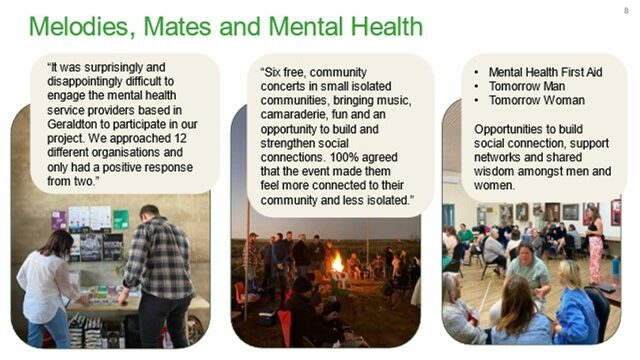
In another example, Mullewa is a small agricultural community in WA, which experiences the challenges of rural isolation, declining population, long distances and dependence on the weather for economic success in farming and tourism. These challenges were putting many at risk of poor physical and mental health, exacerbated by the consequences of COVID which saw events cancelled that traditionally brought people together and sustained strong social connections.
The Mullewa Community Resource Centre used their grant to deliver six free, community concerts in the smaller remote locations in the district. Each event brought people together for a BBQ, music and an interval during which there was a presentation regarding mental health. There was always a collection of resources that people could take home. They also conducted events in Mullewa at the end of the year and at the Mullewa Agricultural Show, which not only attracted the locals but visitors who were in town.
To really drive home the mental health message and develop the skills and capacity of the locals, the Resource Centre engaged a facilitator to run a Mental Health First Aid course. While only nine people attended, it actually meant that one additional skilled person was now available for every 50 adults in their community.
With the remaining funds, they engaged professionals to facilitate “Gather with the Women of Mullewa” and “A Night with the Blokes of Mullewa”, with both workshops focused on open, honest communication about how you are feeling with loved ones, family or friends.
Overall, they estimate about 500 people participated, sometimes more than once. The music events brought people together and built shared memories, while the training events built vital skills and networks and the confidence to use them when needed.
Creating a Safe Space
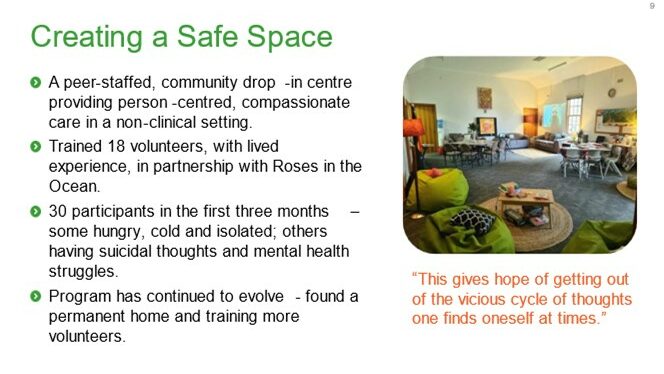
Another great example is local suicide prevention group, Every Life Matters (ELM), who teamed up with the Castlemaine Neighbourhood House to establish the Castlemaine Safe Space. It has become an inclusive venue for people to connect with others when feeling vulnerable.
Working with the local health services, ELM identified when there were local spikes in calls for assistance and pinpointed two evenings per week where there seemed to be a greatest need and aimed to operate over those times.
While the challenge was on to find a suitable location, the group worked with Roses in the Ocean and Living Works to develop a training schedule to support lived experience volunteers to work at the Safe Space during opening times. The In a Good Place program provided seed funding to support the training and purchase some basic equipment for the space.
Eighteen peer volunteers were trained in the first instance, and the centre welcomed more than 30 people through the doors in the first three months. Interestingly, most of them were male.
The Safe Space is now an independent group and has found a more permanent home. They have received additional funding to train more volunteers with lived experience to enable extended opening times and guard against fatigue, and to increase the visibility of the space in the local community. They have also gained funding support from the local Council. This is an innovative project and one that we watch with interest as it develops and progresses.
Small grants, big impact
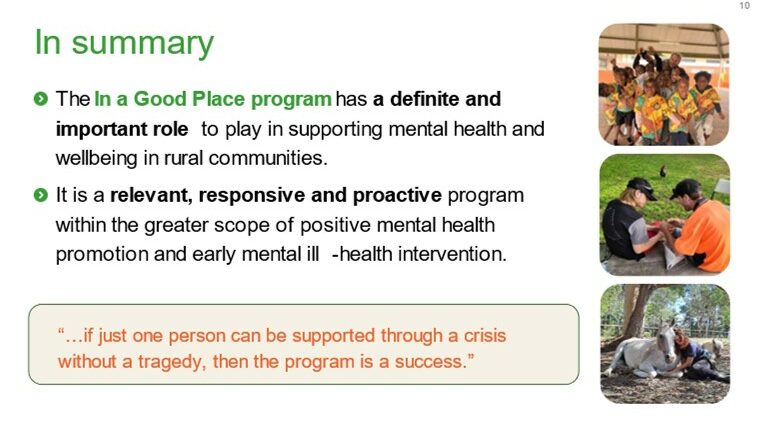
The In a Good Place program – and targeted small grants more generally, have a definite and important role to play in supporting rural communities to activate their ideas and solutions.
Analysis of final reports confirm that at a community level, the program has increased the knowledge and understanding of mental health issues in those rural communities, and helped to reduce stigma for those experiencing mental health challenges.
It is a relevant, responsive and proactive program within the greater scope of positive mental health promotion and early mental ill-health intervention.
We acknowledge that it is a relatively small contribution. But the communities we work with tell us they are forever grateful that the funds were available to support them.
One grantee sums this up perfectly, “If just one person can be supported through a crisis without a tragedy, then the program is a success.”
If you’d like to add your support to these kinds of impactful community-led projects, please contact our partnerships team.

